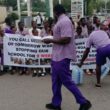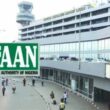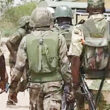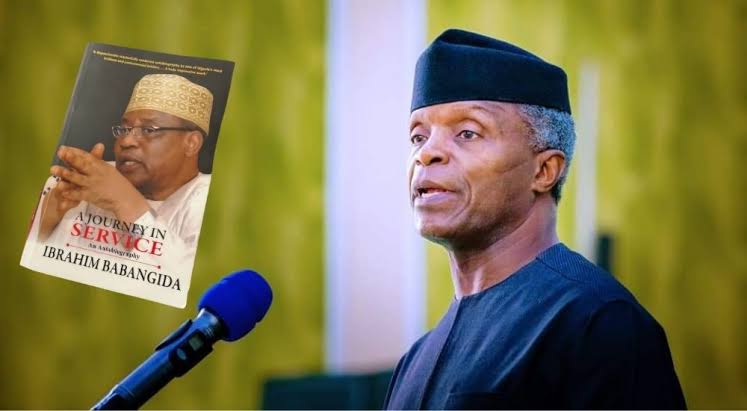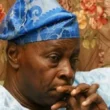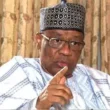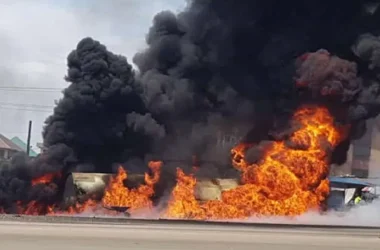Babangida: A Journey in Service is an important book in many respects.
First it is not just the story of the remarkable journey of former President Ibrahim Badamasi Babangida from childhood to the highest levels of public service, it the story or stories of a journey of a nation, our Nation Nigeria, the Nigerian story, complex, sometimes unpredictable, sometimes stranger than fiction, but always fascinating.
Many of the key figures in this book and who shaped the history of our country are here with us today, demonstrating something truly unique about Nigeria: our ability to move beyond the past and come together.
Seated among us is General Yakubu Gowon, who became Nigeria’s Head of State at just 32 and led the country for nine years.
His government was overthrown in 1975 by a coup involving then-Brigadier Olusegun Obasanjo, Brigadier Theophilus Danjuma, and the author himself, Babangida, who was then commander of the newly formed Armoured Corps.
Also involved were then-Lieutenant Colonels Muhammadu Buhari, Sani Bello, and Sani Sami.
Yet, here we are today, with former President Obasanjo and General Danjuma present not as adversaries but as witnesses to history, celebrating a fellow statesman.
In a striking turn of fate, the author notes that it was President Obasanjo who, after the tragic assassination of General Murtala Mohammed, insisted that a young Lt.Col. Babangida be appointed to the Supreme Military Council, making him its youngest member at the time.
Also represented here is immediate past President Muhammadu Buhari another leader whose path intertwined with Babangida. It was Babangida who played a key role in the coup that brought President Buhari to power in 1983, and later, in another coup that removed him and brought Babangida himself to power.
Yet, today, President Buhari is represented at this occasion, celebrating the man who overthrew him and detained him for three and a half years his one time old adversary General Babangida .
Then there is gentleman here who was an elected senator in 1992 in the course of Babangida’s Transition Programme, when Babangida annulled the 1993 election, and General Abacha took over and dissolved the Senate. He tried to reconstitute the senate in resistance to the dissolution he was detained and charged to court, he escaped into exile. Today, he also is here to celebrate with his erstwhile tormentors but now as President and Commander in Chief of the Armed Forces of the Federal Republic of Nigeria, President Bola Tinubu GCFR .
The the third reason why this 420-paged book is important is because it unveils one of the most enigmatic leaders Nigeria has ever had. A man who some call Maradona, others the evil genius, baring his mind in his own words, in writing, for the first time since he left office 32 years ago.
In this compelling account he tells of his early life in Minna, his parents, his siblings, his primary school,-Gwari Native Authority primary school, how he became an orphan at age 14: at age 16 entering the Provincial Secondary School, Bida the school which later became Government College Bida:
His class, the class of 1957-1962 produced:
- two Nigerian Presidents,
- four state Governors,
- a former Chief Justice of the Federation, two Federal Ministers:
His classmates
- Abdulsalami Abubakar (General)
- Sani Sami (Colonel)
- Sani Bello “(Colonel)
- Garba Duba “( Major General)
- Muhammed Gado Nasko (Lieutenant General)
- Abdulmumini Keki Manga ( Brigadier General)
- Mohammed Mamman Magoro ( Major General)
- Paul Babale (Brigadier General) &
- Mamman Vatsa who joined in their third year.
Babangida reveals his nickname, the nice one, to readers. It was blockbuster for his sporting exploits but Gado Nasko and Ismaila Ahmed coined a nastier nickname for him, Kulele, because of his stocky physique…..,( the author notes jokingly , I never forgave them) .
Babaginda became Head boy of the school in his final year.
Then he tells of how he changed his name from birth which was Ibrahim Badamasi to Ibrahim Badamasi Babangida.
He recalls that during official engagements officers confused his last name Badamasi with the Yoruba name, ‘Gbadamosi,’ and many repeatedly asked him whether he was Yoruba. That question had also come up a few years before, during his enlisting interview for the military. He says to eliminate the confusion “ I decided to take on my father’s other name Babangida as my last name”.
He tells the story of how he became interested in the military.
A certain teacher Pa Onimole, who, as a twenty-four-year-old, had taken up a voluntary three- month leave-of-absence from his teaching job at King’s College in 1930 to help set up and popularise Science Education in northern Nigeria, and who ended up spending his entire teaching career in the north.
By the time he died in Ibadan at 78 in 1984, Pa Onimole, had taught and mentored several generations of students in northern Nigeria, including General Yakubu Gowon and the author.
But More than just laying a sound science foundation for us, writes the author, “Pa Onimole was the first to get many of us interested in a career in the military. Shortly after independence in 1960, Pa Onimole invited his former student, Captain Yakubu Gowon, to give us a career talk on the military. Captain Gowon, handsome and smart-looking in his properly starched army officer’s uniform, spoke to us brilliantly, in his now- familiar shrill voice, on the benefits of a military career. His career talk left a mark that stayed with most of us.”
However in a remarkable twist of fate, several years later, Yakubu Gowon, became Head of State & then he was deposed in a coup in which the author participated.
While living in England he was implicated unjustly by Dimka who had led a failed coup. The SMC then decided to strip Gen Yakubu Gowon of his rank as a 4-Star General and dismissed him from the Nigerian army.
The author writes and I quote him: “….although I was a member of the SMC that made that painful decision on General Gowon, I am happy that as President, I restored his benefits and full ranks in 1986 as a distinguished General of the Nigerian Army.”
The author also tells the story of his combat experience during the civil war, his favourite commanders General Wushishi and General Danjuma, the most unfortunate aspect of the war experience for him was that it brought him into combat confrontation with some young officers from the Biafran side with whom he had trained as a cadet and who now had to fight on the Biafran side.
Interestingly, a good number of them who survived remained his friends after the war and long afterwards.
But perhaps the most unforgettable occurrence of the civil war for him was the injury that nearly killed him, in the course of a firefight in Uzuakoli Umuahia he was hit by a shrapnel that eventually was lodged in his chest.
He tells of how he was evacuated to the Lagos University Teaching Hospital, Idi-Araba, and while he was in hospital recovering from his injuries on Saturday April 19, 1969 he watched on TV in the common room of the hospital as the then Head of State Commander in Chief General Yakubu Gowon married his beautiful black beauty the then Victoria Zakari.
There and then he made up his mind to get married and he already knew who he wanted to marry. And he went looking for her as soon as left the hospital. She was also a black beauty, the then Maria Okogwu. He met her through his childhood friend and her cousin Garba Duba, she lived with her uncle Garba Duba’s father. When he proposed to her she turned him down because of his reputation as a playboy. But she later agreed after her uncle put in a word for him. She became Maryam Babangida.
The author devotes a whole chapter to her remarkable life and times , as a devoted wife of his children, a generous hostess and the First Lady of Nigeria who redefined the office of First Lady and went on to engage in some of the most consequential social investment Programmes of that period including the Better life for Rural women Programme.
The author also gives his own account of his much talked about dramatic encounter with Dimka the leader of the coup that led to the assassination of then Head of State General Murtala Mohammed. He recalls that Dimka was holed up at the broadcasting station immediately after the assassination of the Head of State. The author relates how, not knowing that there had been a coup attempt, he arrived for a meeting with General Akinrinade at the army headquarters and as sauntered into the top floor of the building: the General shouted at him “Ibrahim, where the hell have you been?. We’ve been looking for you. You must go and see T.Y. (Danjuma) immediately,’ he continued.
Convinced I was being sought after because of our ongoing meeting on the army’s reorganisation, I looked at my wristwatch and told the General I was on time since it was yet to be 9 a.m.!
‘Who’s talking of a meeting?’ the General thundered back. ‘Haven’t you heard what happened, that the head of state has just been assassinated and that Major Dimka has made a broadcast claiming to have taken over?’. He then went to Gen Danjuma’s office.
The author writes:
“Danjuma’s instructions to me when I met with him were unambiguous: ‘Go to the Radio House and flush Dimka out of that place immediately.’ When we got to the Nigerian Broadcasting Corporation (NBC) Radio House at Ikoyi in an armoured column, we noticed that Dimka’s men surrounded the place, primarily young officers who were a part of the plot, including his ADC, 2nd Lt Samuel Garba.
As I got down from my armoured vehicle, unarmed, and approached the building, Dimka’s ADC, Garba, attempted to stop me. By now, Dimka had spotted me from the storey building and screamed: ‘Ibrahim, I’m going to shoot you’! I shouted back: “Well, that’s okay. If you shoot me, you know my family. You’ll take care of them. They’ll become your responsibility. I have no problem. It would be nice to die in the hands of a friend.’ After a pause, Dimka soberly replied: ‘Ibrahim, I like your guts. Come upstairs.’
And Dimka was indeed a close friend, one of the groomsmen at my wedding to Maryam in Kaduna in 1969. When I got upstairs, I could tell from his breath that he had had a lot to drink. The stench of alcohol from around him and his boys was pungent.
Then, suddenly, his ADC, 2nd Lt Garba, also visibly drunk, nervously showed up and suggested that Dimka take me hostage and use me as a bargaining chip with the government. Dimka angrily screamed at Garba and chased him out. Once Garba scampered out, Dimka and I settled for a ‘frank’ discussion. In doing so, I reminded him of the need to keep things under control to avoid flaring tempers in the circumstances we had all found ourselves in.
First, he wanted to know if I had come to trick him into some form of surrender, When I convinced him that that was not my mission, he calmed down and listened. I asked him what he wanted, and he said he wanted a change of government. He even attempted to persuade me to join them in their attempt!
But even as he made that intolerable request of me, it was apparent from his body language that he knew the game was up. Then, his tone started to change. Could I guarantee his safety? Could I negotiate a written amnesty for him and all his co-plotters? Again, as I had done earlier, I pleaded with him to give himself up and avoid any form of conflagration that could damage the Radio House and the death of civilians and soldiers. That chit-chat went on for quite some time, and when I appeared not to be making headway with him, I left with a promise to return later.
Meanwhile, I returned to General Danjuma to give him a report of my encounter with Dimka. Danjuma was furious. He ordered me back to the Radio House with a reiteration of his earlier instructions to ‘flush Dimka out of place immediately.’ I returned to Radio House with Chris Ugokwe, better equipped and prepared.”
I will leave you to read what happened next, buy the book!
But the reasons why this autobiography is long awaited is more because of the innumerable controversies that were spurned in the Babangida era.
Babangida himself described these events as “the events that shook the administration to its foundations under our watch…”
These include the death of Dele Giwa, the killing by letter bomb of the charismatic journalist and publisher of Newswatch a weekly political news magazine in his home on October 19, 1986, the Vatsa coup, a coup that implicated one of his closest childhood friends, and the decision to execute him:
The Gideon Orkar coup, a coup that took the life of his ADC and nearly took his life and his wife, how they escaped the coupists, how the coup was foiled by then Chief of army staff General Sanni Abacha .
The OiC palaver, the controversy as to whether the government had surreptitiously taken Nigeria into membership of the The Organisation of Islamic Cooperation ( OIC):
The 1989 SAP riots, the deadly riots over the harsh economic effects of the government’s Structural adjustment policy, the C-130 air crash on September 26, 1992, the crash of a Nigerian Air Force Lockheed C-130 H transporter aircraft in the swamps off the Lagos coast barely 3 minutes after taking off from the Ikeja airport. Killing a total of 159 officers including the crew and nine foreigners.
The crash wiped out some of the brightest and best middle cadre officers of the time and there was the allegation that the government masterminded the crash to stave off a coup against the administration especially since the failure of the Orkar coup.
Then there is a full chapter devoted to the transition to military rule and the June 12 saga. June 12th was a decision with cataclysmic consequences , it was the annullment of what had been said to be the freest and fairest election in Nigeria’s. The annulment led to a military interregnum that was considered one of the most vicious in Nigeria’s history , the eventual death of the acclaimed winner of the election, and his wife.
The author deals with all these issues and for the first time answers these questions fully, for example he tells us for the first time who annulled the June 12th election ( I will not disclose you must buy the book to find out )
He puts the facts out there, he gives his own reasons for the actions he took , and he admits where he believes he was wrong. He also answers the question whether Abiola actually won the elections.
I quote him “Although I am on record to have stated after the elections that Abiola may not have won the elections, upon deeper reflection and a closer examination of all the available facts, particularly the detailed election results, which are published as an appendix to this volume, there was no doubt that MKO Abiola won the June 12 elections. Upon closer examination of the original collated figures from the 110,000 polling booths nationwide, it was clear that he satisfied the two main constitutional requirements for winning the Presidential elections, mainly majority votes and geographical spread, having obtained 8,128,720 votes against Tofa’s 5,848,247 votes and securing the mandatory one-third of the votes cast in 28 states of the federation, including Abuja……..I am gratified that the Buhari administration finally recognised him as a former head of state”
He concludes in the book and I quote him : “looking back now, the June 12 saga was undeniably the most challenging moment of my life and, in certain respects, one of the most painful….. and he went on to admit “If I had to do it all over, I’d do it differently.”
I will certainly not go into all the details of what he said on these issues otherwise there will be no point buying the book, I urge you to read the book and then make up your own mind whether you agree or disagree. I am glad that he has laid several years of controversy to rest by speaking his own truth.
Let me conclude Mr. Chairman by saying that by any standard, Babangida’s Journey of Service is an extraordinary book. It is a collection of stories from a life deeply intertwined with Nigeria’s contemporary history, —told with remarkable wit, insight, and a vivid sense of place. Babangida’s storytelling ability is undeniable; he draws the reader into each moment, making history feel immediate and alive. His prose flows effortlessly from one era to another, from one pivotal event to the next, in a way that is both engaging and easy to read.
He is generous in his praise of others, acknowledging the contributions of many along the way. Yet, despite the richness of his narrative, this book will not silence the debates or end the controversies surrounding his years in power especially the final chapter of his leadership. The questions will persist, the criticisms will continue, but that has always been the nature of the Babangida Phenomenon
He remains, as ever, a force of history.
This is a book we must all read….Babangida in his own words! Thanks very much for listening.


